Вход / Регистрация
23.12.2024, 00:41
Главная » 2015 Июль 14 » Controversial Discovery Of Adam's Bridge - A 1,700,000 Year Old Man-Made Structure
09:23 Controversial Discovery Of Adam's Bridge - A 1,700,000 Year Old Man-Made Structure |
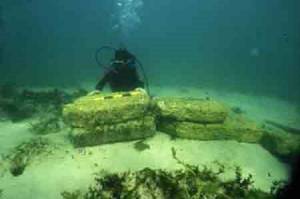 Over the years, a number of remarkable underwater structures have been discovered. Many of them cannot be explained by the traditional views of prehistory, as interpreted by mainstream scientists. The NASA images of the ancient bridge between India and Sri Lanka show ancient history is linked to mythology. Rising seas submerged the Bering Land Bridge, which carried the first Americans from Asia into Northern America, about 11,000 years ago. The recession that melted the Ice Bridge of the Bering Strait might have contributed to global flooding, which is described among all ancient cultures. The Great Flood is not a pure myth, but a real event that occurred in the distant past and led to the extinction of almost all life on this planet. Recent archaeological and geological findings corroborate the ancients' claims of a great cosmic catastrophe that took place some thousands years ago. The rise and fall of global sea levels has exposed and submerged the land bridge in several times during the Pleistocene epoch, between 1.8 million years to 11000 years ago. People and animals could move freely across the continents. According to Dr. Elias, of the University of Colorado's Institute of Arctic and Alpine Research, the Bering Land Bridge was flooded about 10,500 years ago. The level of the Pacific Ocean rose to within 40 meters of its present level and spilled across into the Artic Ocean. The catastrophe led to that the American continent was cut off from Euroasia. Native Americans are very familiar with the Great Flood and they often have detailed accounts describing the cosmic catastrophe. The Athapascan Indians recall: "Every day it rained, every night it rained. All the people slept. The sky fell, the land was not. For a very great distance there was no land. The waters of the oceans came together. Animals of all kinds drowned. Where the waters went, there were no trees. There was no land. Water came, they say. The waters completely joined everywhere. Trees and grass were not. There were no fish or land, animals or birds. Human beings and animals alike had been washed away. The wind did not blow through the portals of the world, nor was there snow, nor frost, nor rain. It did not thunder, nor did it lightning. Since there were no trees to be struck, it did not thunder. There were neither clouds nor fog, nor was there sun. It was very dark." The Chimalpopoca describe conditions during the Great Flood and relate how people tried to escape the disaster. "The sky drew near to the Earth and in the space of one day all was drowned. The mountains themselves were covered with water. ….a tremendous hurricane that carried away trees, mounds, houses, and the largest edifices, notwithstanding which many men and women escaped, principally in caves and places where the great hurricane could not reach them. All this were in darkness, without seeing the light of the sun, nor the moon, that the wind had brought them." There are literally hundreds of similar Flood myths all over the world. 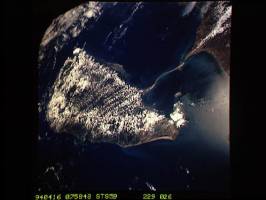 Adam's Bridge A good example showing myths of the ancients that should not be dismissed easily is the Adam Bridge. At the beginning of 2003, NASA's satellites caught extraordinary images that caused a lot of controversy and debate among scientists. The images display an ancient and up to now unknown bridge in the Palk Strait connecting India with Sri Lanka. The bridge has been named Adam's Bridge. It is approximately 18 miles long and could be man-made. 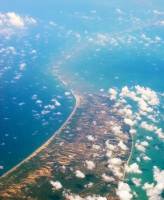 According to the Indian ancient epic the Ramayana, the worshipped hero, Hanuman was honest, loyal and dedicated to Rama. He led his great army of monkey and bears to build the bridge from India to the island of Lanka. 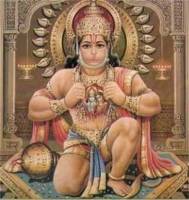 Hanuman is a Hindu god, who was an ardent devotee of Rama according to the Hindu legends. He is a central character in the Indian epic Ramayana and its various versions. "...all the monkeys, following Nala's (monkey's) orders, gathered trees and rocks and brought them from the forests to the shore, and set them in the sea. Some carried timber, some used the measuring-rods, some bore stones; huge was the tumult and noise of crags and rocks thrown into the sea. The first day fourteen leagues were made, and on the fifth day the bridge was finished, broad and elegant and firm -- like a line of parting of the hair on Ocean's head. Then the monkey host passed over, Rama and Lakshman riding upon Sugriva and Angada. Some monkeys went along the causeway, others plunged into the sea, and others coursed through the air, and the noise of them drowned the sound of the ocean waves..." (Myths of the Hindus, A. K. Coomaraswamy) Lord Rama could in this way cross the waters and rescue his abducted wife. At this point, it gets very interesting because this bridge is actually described in ancient Hindu scriptures. In the epic it is mentioned how Ramayana built a bridge 1,700,000 years ago between Rameshwaram (today's India) and the coast of Sri Lanka. Ever since this discovery was made there has been a heated debate whether the structure seen on the satellite images is really man-made or a natural formation. 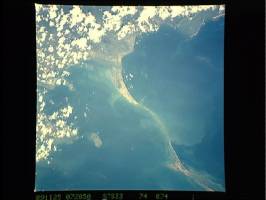 Satellite photo of Adam's Bridge. For a long time, the city of Dwaraka, a city in gold, one of the seven holy cities was considered to be nothing but a pure myth. Dwaraka was Krishna's city and it said that: "On the same day that Krishna departed from the earth the powerful dark-bodied Kali Age descended. The oceans rose and submerged the whole of Dwaraka". The people of Dwaraka witnessed the approaching catastrophe and the city's submergence in the sea. Everything is described in detail in the Mahabaratha. "The sea, which had been beating against the shores, suddenly broke the boundary that was imposed on it by nature. The sea rushed into the city. It coursed through the streets of the beautiful city. The sea covered up everything in the city. I saw the beautiful buildings becoming submerged one by one. In a matter of a few moments it was all over. The sea had now become as placid as a lake. There was no trace of the city. Dwaraka was just a name; just a memory" Dwaraka was considered to be a legend for more than 5,000 years until Dr. R.S Rao, a respected Indian marine archaeologist discovered underwater structures under the sea-bed off the coast of Dwaraka in Gujarat. He described the remarkable finding in his book The Lost City of Dwaraka. What inundated Dwaraka is uncertain, perhaps a tsunami. What is certain on the other hand is that myths are often corroborated by scientific discoveries. The ancient structural remains found off the shore of Dwaraka demonstrate that ancient myths and legends should not be ignored without further investigation. The submergence into the sea of Dwaraka, as it is described in the great epic Mahabaratha is no myth. This city did exist and its remains rest underwater. When the ancient people wrote of Adam's Bridge, they did not lie. The remains of the bridge have also been discovered. Our ancestors knew more of the ancient world then we do. If our goal is to learn more about the history of this planet, then it is essential to take myths and legends more seriously and compare them with the latest scientific discoveries. In the end, many more "myths" might soon be confirmed by science. |
| Категория: Archaeology | Просмотров: 1998 | |
| Всего комментариев: 0 | |



